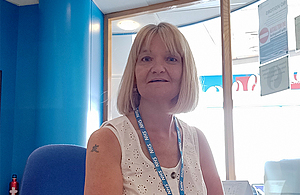Dame Ottoline Leyser appointed new CEO of UK Research And Innovation (UKRI)
Business Secretary Alok Sharma has today (14 May) appointed Professor Ottoline Leyser DBE FRS as the new CEO of UK Research and Innovation (UKRI).
Professor Ottoline Leyser is a leading British plant biologist and Director of the Sainsbury Laboratory at the University of Cambridge. Starting the position on Monday 29 June, as UKRI CEO, Professor Leyser will guide the delivery on the government’s ambitions to increase investment in research and development (R&D) to 2.4% of GDP by 2027, establishing the UK as a global hub for science and technology, now and far into the future.
This appointment will ensure the UK research sector remains at the forefront of new advances to tackle the biggest industrial and societal challenges affecting the world today including climate change, healthcare and the current coronavirus pandemic.
Business Secretary Alok Sharma said:
Professor Leyser’s appointment comes at a critical time for the UK. The coronavirus pandemic has shown the importance of science for our future and UKRI has a vital role to play in this.
As the new Chief Executive, Professor Leyser will drive forward UKRI’s mission to create the great British companies of the future and help keep the UK at the cutting edge of global research and development.
I would like to thank Sir Mark Walport for his dedication to UKRI, leading its transformation programme and championing science, engineering and technology across the UK.
Science Minister Amanda Solloway said:
I am thrilled with the appointment of Professor Leyser and I look forward to working closely with her to drive forward our shared ambition to boost our world-leading research and development.
Since its launch in 2018, UKRI has gone from strength to strength. Professor Leyser has already led a highly collaborative lab in her previous role which will be a great skill to bring to UKRI as it embarks on a new stage of exciting evolution.
I would also like to personally thank Sir Mark Walport for his dedication to this role.
Professor Ottoline Leyser commented:
UKRI has a unique opportunity to make a profound contribution to tackling the many challenges facing the world.
During my career, I have seen the power of genuinely collaborative cultures to catalyse the transformative thinking needed to create effective solutions.
I look forward to working with the UKRI team to ensure that the UK’s superb research and innovation system continues to work for everyone, by pioneering new partnerships, developing innovative funding models and strengthening international collaboration.
About UKRI
UKRI works in partnership with universities, research organisations, businesses, charities and government to create the best possible environment for research and innovation to flourish, ensuring the UK remains a world-leader in science and research.
UKRI was established on 1 April 2018, bringing together 7 existing research councils, Innovate UK and Research England. It has a combined budget of £7 billion.
About Professor Ottoline Leyser DBE FRS
Ottoline received her BA (1986) and PhD (1990) in genetics from the University of Cambridge. After post-doctoral research at Indiana University and Cambridge, she took up a lectureship at the University of York, where she worked from 1994-2010.
Among her honours are the Society of Experimental Biology’s President’s Medal (2000), the Royal Society Rosalind Franklin Award (2007), the International Plant Growth Substance Association’s Silver Medal (2010), the UK Genetics Society Medal (2016), the European Molecular Biology Organization (EMBO) Women in Science Award (2017) and the British Society for Developmental Biology’s Waddington Medal (2020).
She was appointed a Dame Commander of the Order of the British Empire (DBE) in the 2017 New Year Honours list for services to plant science, science in society and equality and diversity in science. She is a Fellow of the Royal Society, an International Member of the US National Academy of Sciences and a Member of the European Molecular Biology Organisation and the Leopoldina. She is a Fellow of Clare College.
She currently chairs the Royal Society’s Science Policy Expert Advisory Committee and serves on the Council for Science and Technology.
